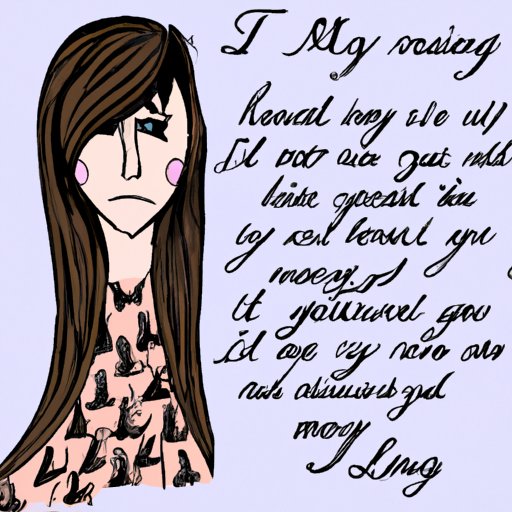
I. Introduction
When an expecting mother loses her pregnancy before the twentieth week, it is known as a miscarriage. While this traumatic event affects many families globally, it is still a topic many people avoid discussing. Often, people who experience a miscarriage find themselves alone in grieving, confused, and unsure of how to cope with this emotional pain. Therefore, in this article, we will explore what happens when you have a miscarriage, the physical and emotional effects, coping strategies, and ways to seek support.
II. The Emotional Rollercoaster of Pregnancy Loss: A Personal Account
A common symptom of miscarriage is bleeding, severe abdominal and vaginal cramping, and tissue or clot passing from the vagina. Unfortunately, not all cases of pregnancy loss have such easily recognizable symptoms, and missed miscarriages can be devastating. Hearing from individuals who have had miscarriages helps to understand the emotional journey most people go through. In shared personal stories of miscarriages, individuals talked about their sense of isolation, denial, anger, and guilt.
Moreover, the impact of a miscarriage on the mental health of individuals should not be underestimated. Depression, anxiety, and post-traumatic stress are common mental disorders that many people develop after experiencing a miscarriage.
III. Coping with Miscarriage: Understanding the Physical and Mental Effects
The physical effects of a miscarriage vary depending on several factors such as how far the pregnancy had progressed, medical conditions, and whether the fetus has already started to pass from the uterus. Women may feel various physical symptoms, including intense cramping, heavy bleeding, or fatigue.
The mental effects of a miscarriage can last a lifetime, affecting pregnancy decisions, mental and emotional health, and even relationships. It is essential for individuals who have experienced this loss to seek professional help and counseling to help them cope. Accepting the fact that a miscarriage occurred is the first step in coping with the emotional pain.
Coping strategies for both physical and mental effects can include taking time off work and other daily routines, eating healthy and staying hydrated, getting enough rest, and seeking emotional support from loved ones or counselors. Individuals who have had miscarriages are encouraged to participate in activities like yoga, meditation, and other relaxation techniques to help manage anxiety and stress.
IV. Honoring and Remembering: Ways to Heal After a Miscarriage
Honoring and remembering the child are essential to the healing process and allow individuals to find peace with the situation. One way to honor and remember is by holding a memorial service for the lost child.
Support resources available to individuals who have had miscarriages include several nonprofit organizations that offer counseling and emotional support. These organizations provide guidance and comfort to individuals navigating their healing process.
Creating a support system to honor and remember can also help individuals who have had a miscarriage to cope. This support system can include family, friends, and partners, and joining support groups can offer a safe space to share their grief and heal.
V. Seeking Support: How Friends and Family Can Help After a Miscarriage
Support is essential after a miscarriage, and friends and family have a crucial role in helping individuals to cope. The first step towards helping someone cope with a miscarriage is to avoid saying anything insensitive or unhelpful words. It’s important to recognize that each person’s journey is unique, and offering emotional support can include just being there to listen, helping with daily tasks or childcare, and creating a safe space for a person to talk about their grief.
Supporting someone after multiple miscarriages can be challenging, but family and friends can help immensely by offering to help with medical appointments, or even researching alternative treatments or support groups that focus on trying to conceive.
VI. The Taboo of Miscarriage: Breaking the Silence and Offering Hope
Miscarriage remains a taboo topic in society, with many individuals feeling isolated in their grief. Breaking the silence and opening up the conversation is important in helping individuals who have had a miscarriage. Offering hope for the future by normalizing the conversation, sharing experiences, and offering support can help those dealing with their loss.
Miscarriage is incredibly common and affects many. Despite its frequency, it remains a topic many feel uncomfortable discussing. Acknowledging the impact of miscarriage is the first step in reducing the fear, guilt, and shame surrounding the topic.
VII. Moving Forward: Navigating Fertility Concerns and Options Post-Miscarriage
Experiencing a miscarriage can have significant impacts on future fertility concerns. Therefore, it’s essential to identify and discuss future fertility options concerning a miscarriage. Often, individuals who have had miscarriages tend to worry about having babies again in the future. Talking to medical professionals and seeking medical advice about future pregnancies is crucial in reducing anxieties about fertility.
Navigating options for future pregnancies often involves medication, therapy, and support while trying to conceive again. For individuals experiencing recurrent miscarriages, fertility treatments such as in-vitro fertilization (IVF) are viable options.
Support resources for individuals concerned about future fertility include medical professionals and support groups tailored to support individuals trying to conceive after experiencing a miscarriage.
VIII. Conclusion
Experiencing a miscarriage can be devastating, and it is essential to acknowledge and discuss the impact of miscarriage on individuals and families. Through shared personal stories, understanding the physical and emotional reactions, coping mechanisms, honoring and remembering, seeking support from family and friends, breaking the societal stigma, and navigating fertility concerns, individuals and families can begin the healing process. Support and compassion are essential in mitigating the emotional and physical impacts of a miscarriage.
We encourage anyone going through this to seek professional help and utilize support resources available for individuals who have had miscarriages. Let us continue the conversation and take steps towards accepting and coping with this life-changing event.




